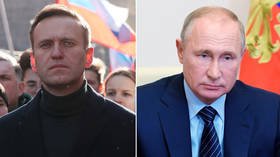If Navalny was poisoned, unlikely it was by Putin: Italian professor pours cold water on ‘state-sponsored assassination’ theory

Western media wasted no time in accusing the Russian government of attempting to kill Moscow protest leader Alexey Navalny with poison, but basic common sense points against the conspiracy theory, an Italian expert has argued.
Navalny fell ill last week during a commercial flight and was rushed to a hospital after his plane made an emergency landing in the Siberian city of Omsk. Two days later, he was flown to Germany to be treated at the Charité University Hospital in Berlin. Doctors there said his symptoms indicate poisoning with a cholinesterase inhibitor – a type of chemical encountered in certain medicines, insecticides, and nerve agents.
Also on rt.com German clinical investigation suggests Moscow protest leader Alexei Navalny was poisoned – hospital statementSince the start of Navalny’s ordeal, his inner circle has been accusing President Vladimir Putin and the Russian government of trying to assassinate the activist and of running a cover-up operation after the attempt failed. This narrative was swiftly adopted by mainstream media in the West. Some Western governments have threatened to impose a new round of sanctions against Russia over the case.
Yet even if criminal intent is proven in the case, basic common sense undermines the ever-popular formula of ‘poisoning + Russia = Putin’, according to an article published by the Italian magazine Formiche on Saturday. The piece was penned by Igor Pellicciari, Professor of History of International Relations at the University of Urbino, who also teaches at MGIMO University, Moscow’s top school for career diplomats.
#Navalny, ecco cosa (non) sappiamo. Il retroscena bombastico del prof. Igor PellicciariLe cifre inedite degli esami del sangue, gli elettrocardiogrammi, le analisi in ospedale. E i possibili mandanti... https://t.co/9TXMUCVapwpic.twitter.com/GBm7Ta9gub
— Formiche (@formichenews) August 29, 2020
The ‘state-sponsored poisoning’ theory has several weaknesses, Pellicciari wrote, starting with the political cost that Navalny’s demise under suspicious circumstances would entail for Moscow. The death of an opposition figure would inevitably be pinned on the Kremlin, prompting sanctions, and further tarnishing its already damaged reputation. It would also fuel domestic discontent, which would be untimely, given that Russia, like many other nations, is currently having to deal with both an economic slowdown and public fatigue with the social distancing measures prompted by the Covid-19 pandemic.
The benefits for removing Navalny from the picture are dubious at best. He may be falsely portrayed as the Russian opposition leader by the Western press, but, in reality, he's part of a relatively small faction of fractured anti-establishment forces in Russia. His corruption investigations and organization of protests make him a thorn in the side of the many powerful people, but not a realistic threat to the powers that be, Pellicciari said.
Also on rt.com Germany’s Merkel calls on Russia to investigate how Navalny was allegedly poisoned & hold perpetrators accountableHowever, while the motive for a state assassination of Navalny is questionable, the capability of carrying one out is not, which doesn’t sit well with what has actually happened, the professor argued.
Navalny was quickly taken to a hospital in Omsk, remaining in the care of Russian doctors for 44 hours and treated with evident success. On arrival, he was given a shot of atropine – a drug that’s effective against certain types of toxins – and reacted so well that the German doctors continued the same treatment after the patient was transferred to their care.
The Russian state had many options to ensure Navalny’s death, if such was its intent, Pellicciari suggested. It could orchestrate a less timely hospitalization or send an assassin to finish the job at the Omsk clinic. It could provide the hitman with a more effective poison from or simply stage an accident rather than use a poison and risk an ugly fall out.
Also on rt.com Doctor who treated Alexey Navalny in Omsk claims he received threats online directed at himself & his childrenSo far Russia has resisted foreign pressure to launch a criminal probe into the situation. Pellicciari believes Navalny may have been a victim of a crime, but if that is the case it is not likely that the hit was ordered from the top echelons of the Russian government. Navalny is a divisive figure and has plenty of lower-caliber enemies, both Russian officials and private citizens, Pellicciari said.
A state assassination would look more like the mysterious plane crash that killed Italian politician Enrico Mattei in 1962, he added.
Like this story? Share it with a friend!














